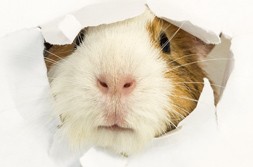Animal-Free Cosmetic Testing Now a Reality

By Celeste Beley
Testing cosmetic products has always been controversial among animal-rights advocates, mostly because of tests that have been conducted on animals or cosmetics that use animal components. While some countries, like China, actually require all cosmetic products to be tested on animals, others, including all of the European Union nations, have banned animal testing altogether. In the United States, animal testing is legal but not required.
Now a laboratory in the United Kingdom has developed a method it claims is cruelty-free and more accurate than traditional testing. Its goal is to work with the industry and governments around the world to help advance “non-animal” cosmetics testing.
An Alternative to Cruelty
XCellR8, located in Cheshire, UK, started with a desire to offer the cosmetics industry the alternative of cruelty-free testing. Its researchers use cells from human skin donated by cosmetic surgery patients. The cells are isolated from the donated samples and then grown in the lab.
The laboratory-grown skin is nearly identical to real skin on the body, including a skin barrier that allows full cosmetic formulations to be applied to the surface. The lab then incubates the skin models with samples or ingredients to evaluate how much damage they cause over time. Cosmetic ingredients can be absorbed into the bloodstream through the skin and then passed to other organs, so testing on actual human skin may more accurately determine the risks or benefits of using products or ingredients.
There are other human cell alternatives to traditional animal testing, but those methods still use animal components such as bovine or horse serum. “In many cases the culture of human cells still requires the use of animal components such as blood-derived components or liver extract, which mean that ultimately animals still have to be sacrificed for that work,” said XCellR8 co-founder Carol Barker-Treasure, Ph.D. “One of the unique things about XCellR8 is that we’ve eradicated all of those components and so we have a truly animal-free testing laboratory,” she added.
In addition to offering ethical advancements, XCellR8 believes its animal-free tests are better at predicting safe human product use compared to traditional animal-based tests.
CLASSROOM DISCUSSION
- What are the benefits and drawbacks to using human cells to test cosmetic products?
- Discuss the pros and cons of animal testing of any kind. Which stance would you take, and why?
VOCABULARY
- Bovine serum
- Horse serum
- Eradicate
- Ethical
